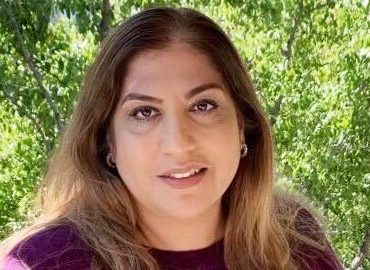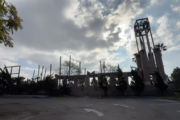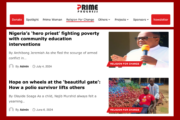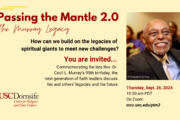Fouzia Azizi vividly recalls the night her family fled Afghanistan nearly 30 years ago. Fearing for their lives, they crossed the border into Pakistan. They traveled lightly, expecting to return soon. “I brought two outfits,” she remembers. “When I changed, I washed the other one right away so it would be dry for the next day.”
It’s hard to imagine Azizi limiting herself to two changes of clothing. In person, she radiates the casual ease of someone comfortable not only in her own skin but also in vibrant colors, statement jewelry, and carefully applied eye makeup. Long gone are the difficult days as a struggling refugee. But memories of hardship and discrimination remain, fueling a passion to help others.
That desire propels her work as the director of refugee services at Jewish Family & Community Services East Bay, in Northern California. There, she and her team—many of them recent Afghan refugees—have assisted nearly 1,500 people since the fall of Kabul in August 2021. (Over 90,000 Afghans have immigrated to the United States since 2021.) In November, when Pakistan announced that more than 1 million Afghans residing in the country without documentation would need to leave or would face deportation, Azizi says that her staff began preparing for another influx. But they’ll need help.
“We need more support,” she says. “There’s so much trauma, anxiety, and mental health issues.”
Still, they’re better equipped today than during the early days of the crisis, when just three staffers were responsible for 94 refugees at JFCS East Bay.
“After Kabul fell, the crisis was nonstop,” says Mina Walizada, the organization’s resettlement supervisor and a former refugee.
Many of the early arrivals had worked with Americans in the public and private sectors. Though fluent in English, they could not find employment in their professions in the United States. Azizi, needing to expand her staff to meet the increase in refugees, hired several as case managers. Homayoon, who asked to be identified by his first name only, says his work for the U.S. military had made him a target for the Taliban. He left Afghanistan before they regained control. Despite his fluency in English and familiarity with U.S. culture, he found resettlement challenging. Now, as the resettlement program’s lead caseworker, he is available to clients 24-7: he understands their frustration with starting over. It’s not just homes and jobs they need; it’s the basics of everyday life, from pots and pans to toys and diapers. Add to that the work of registering for school, Social Security, resettlement benefits, and ESL classes and it’s easy to see why many refugees also require counseling services.
Some are overwhelmed by the magnitude of the change. Others are traumatized by the loss of their old lives. Still others resent their dependence on a country that, in their eyes, abandoned their homeland.
“This is not an easy job,” Homayoon says, sitting in his cubicle. “You’re under a lot of pressure from families who think you can provide them with everything when you can’t. But I learned from Fouzia to treat everyone with dignity and compassion.”
Azizi’s moral foundation comes from Islam, which taught her the value of human life and the importance of showing respect and kindness to all. Growing up, she saw her parents practice their faith through study and prayer and by educating and empowering their children. While still in Afghanistan, they encouraged their daughters to be professionals, and Azizi studied law. But during her years in Pakistan, she found a new path. She met female refugees from conservative households that did not believe in educating women. She convinced many doubters that education would provide their daughters, wives, and sisters with richer, more fulfilling lives.
“We created many schools at the border between Pakistan and Afghanistan,” she says. “We launched a girls’ school and created a curriculum for them. We helped women secure employment and gave girls the opportunity to go to school.”
In 2006, the U.S. government granted refugee status to Azizi, her husband, and their three children. The family boarded a plane in Pakistan, stopped in Germany, and flew to New York and then Oakland, where her parents and several siblings had settled a few years earlier. “Seeing my mom and my sisters, it was so unreal,” Azizi says.
But the reality wasn’t easy. The government offered them “welcome money,” as Azizi calls funding for the family, but no resettlement services. Instead, they stayed with relatives, who helped them acclimate to a new country. Unlike Pakistan, where Azizi knew the languages and understood the culture, the United States was alien. Learning English and adjusting to Western, secular society was challenging. Hardest of all was the prejudice she encountered.
“I have experienced discrimination in this country, and my children have experienced discrimination,” she says, adding that she has faced hostility as a woman and as a Muslim but most of all as a new immigrant.
A decade later, her children grown and her family prospering, Azizi began volunteering to provide immigrants with the care and services she wished she had received. She had previously run a business with her husband and then worked as a translator, but she wanted to provide direct services to refugees. She started at JFCS East Bay in 2016, was soon hired as a case manager, and in 2022 became the director of refugee services. The seeming irony of being a Muslim service provider at a Jewish agency is not lost on her, but she says her values align with the agency’s mission. And she loves her job.
“I’m really proud of the core values of this organization,” Azizi says. “Its mission is to provide services with dignity and care, and that’s exactly what my belief is too.”
Click here to read the full article on Alta Journal.
Diane Winston is a university fellow with the USC Center for Religion and Civic Culture.








